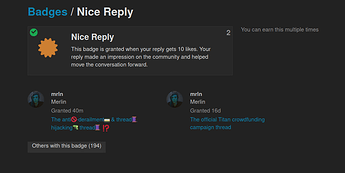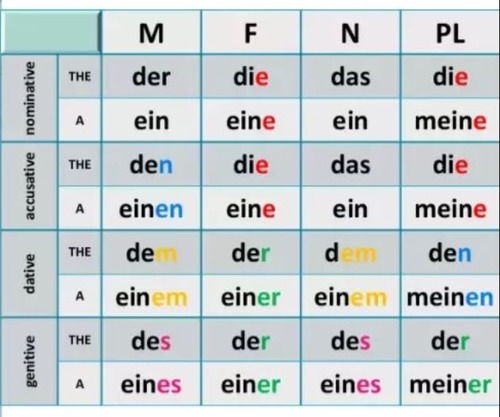
getting a badge for bragging about getting a badge… that’s a new one ![]()
That’s badge-ception
Dutch is German without the crazy declensions - and with one handy consonant to clear your throat while you speak depending on which part of the country you live in ![]()
I’m currently trying to learn Dutch (yeah, non-professional way with a smartphone app ![]() ), and I think it is relatively easy for me, as a native German speaker. I think the grammar is actually pretty similar - good for me, I’m terrible at learning grammar - and lots of words have at least some resemblance. Still, it is a language of its own and not some “dialect” of German or such… one could as well say that German is a dialect of Dutch
), and I think it is relatively easy for me, as a native German speaker. I think the grammar is actually pretty similar - good for me, I’m terrible at learning grammar - and lots of words have at least some resemblance. Still, it is a language of its own and not some “dialect” of German or such… one could as well say that German is a dialect of Dutch ![]()
The second language I’m currently learning is Icelandic - the most unchanged nordic language of all, as far as I know, and that’s really hard for me. Grammar is so different from what I know, and if you think Dutch has some funny-sounding consonants, there is a lot more of that in Icelandic ![]()
From what I’ve heard it’s far easier to go from German to Dutch, than the other way around. The main reason I’ve heard is that German has 4 cases, while Dutch just sometimes has genitive.
This makes learning Dutch grammar not very hard for a German speaker, but the other way around is rough (just as rough as learning German as an English speaker ![]() ). The extra cases are awful.
). The extra cases are awful.
I definitely meant Germanic as far as origin (rather than implying it was a dialect), and it’s generally seen as so due to what I mentioned. Dutch originally had the same 4 cases as modern German, but they’ve disappeared over time, leaving Dutch as simplified compared to the shared ancestor of Dutch and modern German.
That was the way I understood you, don’t worry ![]()
It just happens frequently that people just say that Dutch is so similar to German that is has to be “just a dialect” of it (even in Germany -.- ), so I was more aiming at “those people”, not at you ![]()
Honestly, I wouldn’t understand my own language if I had to learn it… German is just terribly complicated, at least it looks like that for me.
A friend of mine is studying German, and we recently talked about how stupid some words here are - for example, the word for “to drive around sb.” is literally the same word than the word for “to drive over sb.”. It’s both “umfahren” - in the first case you stress the second syllable, in the other case you stress the first. But the meaning is exactly the opposite… ![]()
I first knew I was in trouble when my high school German teacher showed us this chart the first week of class:
That class was all downhill from there… (just kidding, I really loved learning German, I took 3 years of it, and it was a highlight of my high school experience). Ich liebe Deutchland ![]() .
.
Yeah, and that’s what I meant - I can speak German “instinctively”, because it was the first language I learned and because I am always surrounded by it, but if I had to learn it as a second language, I would totally fail ![]()
To be honest, people who have to learn German might end up with a better understanding of this grammar than native speakers… ![]()
Try Finnish case endings sometime ![]() German looks positively simple compared to that.
German looks positively simple compared to that.
Not necessarily.
I learned it enough to get myself a passport and I still couldn’t tell you why i say the stuff I say how I say it. Guess cause I never took classes or learned the grammar but just parroted after other people and mumble through my word endings.
That’s totally legitimate! ![]()
And actually, I’m fine with the general article of “de”, considering lots of (especially younger) Germans already use it that way ![]()
Mind to show some examples? (yeah I know we’re totally derailing this again, but languages are such an interesting field! ![]() )
)
Well, I’m not saying it was Rosco…even though his was the first post in the split…![]()
Actually, I was probably the instigator of that one, Just Roscos was the more natural split point
Agreed
I studied German for a few years in college from a Bavarian instructor and later learned that he taught us some strange stuff LOL He was a crazy old man but it was fun.
Sure. Here’s a simple example sentence to translate into Finnish: “There is no sauna room in your German house”.
Base forms of the words:
To be: olla
Sauna: well… sauna ![]()
Room: huone
House: talo
Germany: saksa
Now let’s combine things:
- Sauna room: saunahuone
- … in partitive case (because there is no room, the sentence is negative and equivalent to “there is not ANY” - so partitive): saunahuonetta
- in the house: talossa (-SSA/-SSÄ ending = inside)
- in your house: talossasi (-SI possessive ending: your. The possessive ending is appended to the -SSA/-SSÄ ending because the language is agglutinative)
- German: saksalainen (-LAINEN/-LÄINEN endind - type, kind, nature of something)
- in something German: saksalaisessa (-SSA/SSÄ ending applies to saksalainen also - agglutinative language. But the N of -LAINEN can’t stay because you can’t have -LAINENSSA / -LÄINENSSÄ, because there are 3 consonants, so it changes to -LAISESSA/-LÄISESSÄ)
- in your German house: saksalaisessa talossasi
- Is (to be, third person): on. But! Here it’s “is not”, so it’s “ei ole” and not “ei on” - litterally "[third person not] [base form of “to be”]: you conjugate the negation, not the verb when the sentence is negative in Finnish
- The “there is…” sentence construct doesn’t exist literally in Finnish. It is typically expressed by reversing the sentence: “In your German house is not any sauna room”
Putting it all together:
Saksalaisessa talossasi ei ole saunahuonetta.
Frighteningly logical and fiendishly clever language, only it’s a totally different kind of logic ![]()
Totally logical, but very complicated… I’m pretty impressed that such gigantic words can come off of such tiny little base words. I was always surprised about the length of finnish words (when I read them on food packaging or whatever), but it makes some sense that way.
Still, I’m happy that I currently have no plans to learn finnish. Even less now. ![]()
And yep, you’re right, I don’t have a sauna. Or a saunahuone. I mean, a saunahuonetta. ![]()
And Pilgrim, as usual - thanks for splitting ![]()
Agglutinative languages lend themselves easily to all kinds of strange world records. German is semi-agglutinative, but Finnish is almost completely. But that don’t mean squat, because it’s really a lot of words and endings stuck together.
But just for shits and giggles:
- Longuest Finnish word that has a meaning in real life: Lentokonesuihkuturbiinimoottoriapumekaanikkoaliupseerioppilas - that would be a “airplane jet turbine engine auxiliary mechanic non-commissioned officer student”
- Word with the most consecutive vowels: riiuuyöaie
![]()
You should: it’s a really interesting pastime and it makes you more clever. I’m not even kidding ![]()
Agree to this - learning languages most certainly makes you more clever, especially if they are as complicated-but-consequent like your example. And they force you to change old habits, to re-think your own language and all that. I really like that ![]()
But I do not plan on visiting Finland in the near future, so it is of more use for me to learn Dutch (for my annual festival visit there ![]() ) and Icelandic (where I might be going this autumn, hopefully) - and Icelandic is pretty agglutinative as well… their longest word is “Vaðlaheiðarvegavinnuverkfærageymsluskúrslyklakippuhringurinn”, which is “the key ring to the tool work shed in the road works of Vaðlaheiði”, a mountain road in North Iceland. Yep, I copy-pasted the word. And the description, since I’m too lazy to search the codes for all those wonderful characters
) and Icelandic (where I might be going this autumn, hopefully) - and Icelandic is pretty agglutinative as well… their longest word is “Vaðlaheiðarvegavinnuverkfærageymsluskúrslyklakippuhringurinn”, which is “the key ring to the tool work shed in the road works of Vaðlaheiði”, a mountain road in North Iceland. Yep, I copy-pasted the word. And the description, since I’m too lazy to search the codes for all those wonderful characters ![]()
Damn, there goes my plan to lure you here with my clever Finnish sentence (which was actually pretty basic, incidentally) ![]()
Oh that’s okay then, you can still come here: I can give you a few Dutch lessons too.
It takes me less than two hours to drive to a place with lots of native speakers of the Dutch language - the Netherlands ![]()
So I think it might be a bit easier for me to go there than travelling to Finland to learn Dutch… ![]()
I appreciate your efforts ![]()




